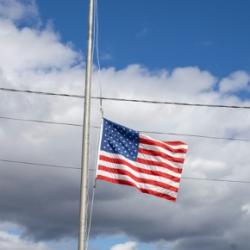We’ve been discussing the idea, popular in some Christian circles, that the United States should be (or already is) a Christian nation, one in which the Ten Commandments should be displayed and obeyed by all. Today, let’s take a look at how the Third Commandment fits into the picture (or as non-Lutherans call it – wrongly – “the Fourth Commandment”).
The Christian nation idea is an outgrowth of the myth that at least some of the founding fathers were devout Christ-followers. Constitutional attorney (and, as mentioned before, atheist) Andrew Seidel argues in his book, The Founding Myth, that the founders as a whole were neither devout nor Christian, and that our founding documents stand in opposition to the idea of a Christian nation.
The 3rd Commandment
“Observe the Sabbath day by keeping it holy, as the LORD your God has commanded you. Six days you shall labor and do all your work, but the seventh day is a sabbath to the LORD your God.
On it you shall not do any work, neither you, nor your son or daughter, nor your male or female servant, nor your ox, your donkey or any of your animals, nor any foreigner residing in your towns, so that your male and female servants may rest, as you do” (Deut 5:12-14).
Is this commandment about going to church?
Andrew Seidel quotes a 1610 Virginia law that was apparently derived from the Sabbath commandment:
Every man and woman shall repair in the morning to the divine service and sermons preached upon the Sabbath day, and in the afternoon to divine service, and catechising, upon pain for the first fault to lose their provision and the allowance for the whole week following; for the second, to lose the said allowance and also be whipt; and for the third to suffer death.
Obviously, this law is not about setting aside time to rest – it’s about “imposing religious conformity; about forcing people to worship and believe in a certain god.” (This reminds me very much of the ten years I lived in Saudi Arabia.) Of course, such a law could not exist in the US today.
Death penalty? Really?
But what’s the deal with the death penalty? Was Virginia going overboard?
Actually, Virginia was lenient, compared to the Biblical punishment for breaking the Sabbath:
“The Israelites…found a man gathering sticks on the sabbath day. Those who found him gathering sticks brought him to Moses, Aaron, and to the whole congregation.
They put him in custody, because it was not clear what should be done to him.
Then the Lord said to Moses, ‘The man shall be put to death; all the congregation shall stone him outside the camp.’ The whole congregation brought him outside the camp and stoned him to death” (Numbers 15:32–36).
(A perk for those who obeyed the Sabbath command is that they got to communally stone to death the transgressor.)
(This is where you might say, “Holy Sabbath, Batman!” or other exclamation – just try not to break the “God’s name in vain” commandment!)
Gotquestions.org explains why such a stringent punishment was appropriate:
For Israel, keeping the Sabbath was a sign of obedience to God’s covenant. Those who did not observe the Sabbath by ceasing from work were by their actions openly proving that they were not partners in the agreement.
The weekly Sabbath is also a symbolic reminder of God’s divine, eternal rest, and the death penalty for working on the Sabbath pointed to the fate of unbelievers who refuse to enter God’s rest through the atoning death of Jesus Christ on the cross.
(I have written elsewhere on the topic of unbelievers, and will not comment here.)
(Commercial: if you question “business as usual” in Christianity – or want to question it – subscribe to my newsletter, and we can journey together!)
What about Sunday closing laws?
Seidel points out that even “Sunday closing” laws – still in effect today – do not exist for the purpose of enforcing religious observances. In 1885, the United States Supreme Court ruled:
Laws setting aside Sunday as a day of rest are upheld not from any right of the government to legislate for the promotion of religious observances, but from its right to protect all persons from the physical and moral debasement which comes from uninterrupted labor.
Such laws have always been deemed beneficent and merciful laws, especially to the poor and dependent, to the laborers in our factories and workshops, and in the heated rooms of our cities, and their validity has been sustained by the highest courts of the states.
Seidel notes,
Nothing could be more fundamentally opposed to our First Amendment and founding principles than such a law. This is why the Supreme Court, although it has upheld Sunday closing laws in some instances, has struck down any religious aspects of or religious rationale for those laws.
A “day of rest” sounds like a great idea – especially today, when infinite entertainment and information are literally at our fingertips. Connecting with God’s rest after six days of creation (Genesis 2:2-3) and with our future rest (Hebrews 4:1-10) are also meaningful. But framed as a demand, with the death penalty for noncompliance, makes it feel less like “covenant” than bullying.
The intersection of Sabbath and slave-holding
Seidel reminds us,
[The Sabbath commandment] recognizes that human beings can be property: “You shall not do any work—you, your son or your daughter, your male or female slave, your livestock…”
Slaveholders believed themselves to be executing the Christian duty to “love our neighbors” by civilizing their slaves, by bringing them out of “the barbarisms and idolatries of paganism”…
By exposing “the African race” to “the humanizing influence of Christianity” through their bonds, the slavers believed they were doing the slaves a favor—they were saving Africans by enslaving them. The slave owners justified enslaving an entire race using the perceived superiority of Christianity.
Frederick Douglass, who had escaped from his master, had something to say about the Sabbath and the “Christian witness” of his master:
“[The master’s] religion hindered him from breaking the Sabbath, but not from breaking my skin on any other day than Sunday.
He had more respect for the day than for the man for whom the day was mercifully given; for while he would cut and slash my body during the week, he would on Sunday teach me the value of my soul, and the way of life and salvation by Jesus Christ.”
Just a few years later, in a Thanksgiving sermon for the First Presbyterian Church in New Orleans, Rev. Benjamin Palmer had this to say about the growing movement to end slavery:
“…in this great struggle, we defend the cause of God and of religion. The abolition spirit is undeniably atheistic.”
It is well established that Christianity contributed to the preservation of slavery. The Sabbath commandment only added an ironic twist to the practice by “Christian slaveholders.”
Our house is in disarray
So…even if our founders had left room for the US to be a Christian nation – what makes us think we could pull it off?
The recent Covid pandemic is just one example of how dysfunctional American Christianity is. Christian squabbling over the 2020 election, the fight over the election results, Christian symbols at the January 6 incident – and so, so much more – show us that we are a deeply flawed community.
We don’t know how to follow Jesus, and we certainly don’t know what we’re talking about when we refer to the Ten Commandments.
The (alleged) Christian leaders who want to guide us into Christian nationhood are incorrigible and unworthy, to put it mildly. They are incapable of governing themselves, let alone a nation.
Most importantly, godliness is not a thing to be legislated and enforced; it grows naturally out of love – another area in which we Christians are sorely lacking.
America’s founders had no intention of building a Christian nation, and that is part of their wisdom.
(If you are energized by challenges to the evangelical status quo like this, please subscribe to my newsletter! If you would like to comment on this post, please pop over to my Facebook page. All of my posts are there and open to constructive comment! I welcome your thoughts.)
OTHER POSTS THAT MIGHT BE OF INTEREST:
- Did you know? The “pro-life” party is also pro-suicide
- Texas wants to take away religious liberty
- Catholic church sex abuse scandal in the light of eternity
- Examining the doctrine of Biblical inerrancy
- Epic evangelical self-assurance around abortion
FEATURED IMAGE: “BATMAN” by Shed On The Moon is marked with Public Domain Mark 1.0.













